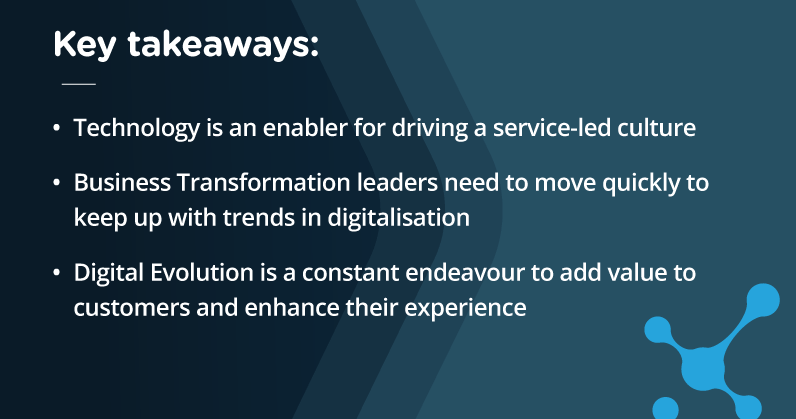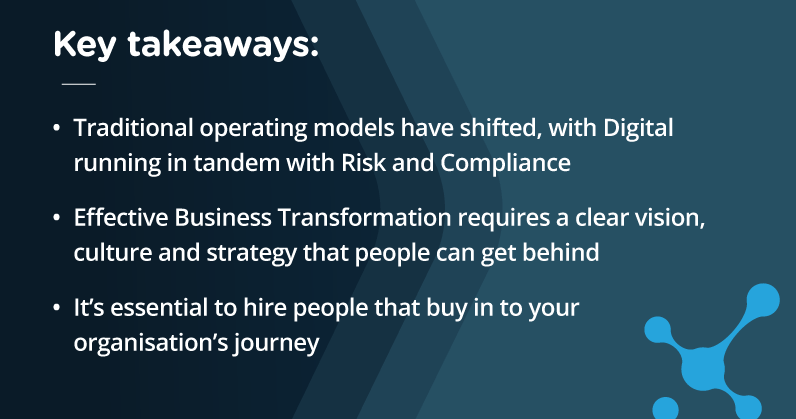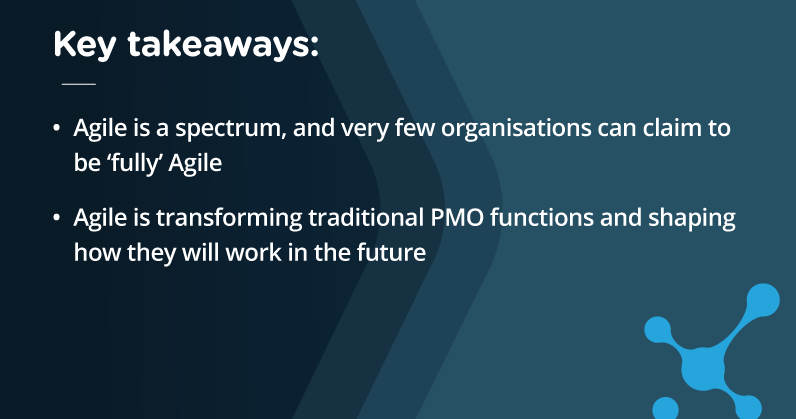Digital Transformation and the Future of the PMO Function – Insights from Our Recent Project Services Round Table 2
We recently launched our series of Project Services themed round table events with an inaugural gathering of senior Transformation leaders from a variety of industries across the Sydney market. Discussions focussed on two topical themes: Digital Transformation and the Future of the PMO function in an Agile world, with the overarching aim of providing an open platform for individuals to discuss key challenges and takeaways based on their own experiences.
The evening proved to be both thought-provoking and insightful as we debated on how the future of the Project Delivery world should be shaped. Here are some of the key insights from the event.
Digital Transformation or Digital Evolution?
After a brief icebreaker and an introduction from our Chairperson, Lendlease’s Global Head of Technology Office Practice and Organisational Design, Claudette Gajda, we dove straight into our opening topic: Digital Transformation.
The conversation opened with a discussion on innovation and how organisations can add value to customers and enhance their experience through technology.
One example came from Kylie Barrett from the Real Estate firm Goodman, who discussed how they are implementing a new tool that identifies areas of population growth which indicate potential new customers; a great example of how digitalisation can take a business forward, whilst also enhancing a customer’s experience.
The consensus around the table was that technology is not merely a facilitator but is also an enabler for driving a service-led culture, with no defined endpoint, as there is always something new ahead. As Kylie Mathews from IAG articulated, the world is constantly spinning outside of business, and it is important for Business Transformation leaders to think quickly and decisively to keep up with these trends.
Consumers want everything instantly at their fingertips; they want to feel valued and known intimately, and platforms need to address these needs accordingly. This raises the question of whether the phrase “Digital Transformation” should be rebadged as “Digital Evolution”? Syntactically, the word “transformation” suggests travelling from one point to another, whereas “evolution” is a constant process that has no determined ending.

What Comes First: The Operating Model or the People?
With a smattering of leaders from the Financial Services industry, the conversation moved on to the subject of the Royal Commission and how forward-thinking Digital projects are frequently being put on the backburner, with a greater focus on Risk, Compliance and Remediation.
Many Financial Services organisations are arguably already behind their Industry and Commerce counterparts, with the danger of falling further behind as a result of changing priorities following the Royal Commission. However, many organisations are running with Digital controls in the background, bringing about a shift in operating models with Digital running in tandem with Risk and Compliance.
So, what comes first: the operating model or the people? It is clearly very important to bring the right people on board and utilise them in the most suitable roles, but the initial step should be to utilise the talent already within the organisation, as they bring an abundance of internal knowledge.
Lendlease, for example, adopts the notion of a ‘capability hub’, rotating people around different departments in order to give them insights into the workings of other areas. This Agile approach allows the business to be more cross-functional, thereby adding more value to clients.
The room discussed how, in such a period of transformation and change, it would be easy for people to lose interest and be fatigued by the constantly moving landscape, which is why it is crucial to set a clear vision and a belief in that vision. The consensus was that a culture and a strategy have to be created and that people have to be brought on the journey in order to realise their role within the bigger picture and feel motivated to deliver business outcomes.
Suncorp’s Michael Pugh emphasised that if you do not hire people that buy into that journey, you will come unstuck. He explained how he created a DNA within his team and hired a certain mould of individual, rather than someone who could simply do the job. He utilised a blended interview style that factored in ethics, values and external interests, as well as competency-based questions, in order to get a picture of the holistic individual.
This illustrates the shift in traditional hiring methods working alongside the shift towards the use of Agile, whilst also demonstrating how it is not only a methodology but a mindset as well.

How Will Agile Shape the Future of the PMO Function?
When discussing Agile, the focus is often more on the mindset than the methodology. We argued that it is more about the delivery and outcomes, and considered how Agile can exist alongside traditional PMO functions, which often rely on budgeting, planning and forecasts.
Agile, in the methodology sense, is a spectrum, and very few organisations can claim to be ‘fully’ Agile. Jodie Weir from The Iconic illustrated how, within her organisation, delivery models align to the business aims and the business adapts to these needs, rather than being hung up on creating the structure of a designated PMO function. This is reflective of The Iconic’s position as a new organisation but may suggest that, if organisations continue to evolve in the same manner, PMO functions could become largely irrelevant or redundant in future.

Watch this Space
Our first Project Services round table was an insightful evening, the conversation could have easily run on for some time had it not been getting rather late! It was fantastic to bring together professionals from lots of different industries and to give something back to a community that we are so passionate about.
We are excited to continue facilitating these events in future, with the aim of creating communities of practice, gathering thought leaders to share ideas and staying on the cutting edge of market trends in a way that is both enjoyable and engaging.
If you would like to know more about our upcoming round table events, get further insights into today’s Project Services market or learn how we’re driving conversations about the future of PMO, feel free to connect with James Holland or myself.